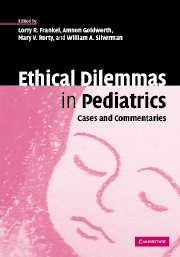Book contents
- Frontmatter
- Contents
- List of contributors
- Preface
- Introduction
- Part I Therapeutic misalliances
- Part II Medical futility
- Part III Life by any means
- Part IV Institutional impediments to ethical action
- 10.1 Ethical problems encountered with oncology and bone marrow transplant patients
- 10.2 Ethics in the pediatric intensive care unit: oncology and bone marrow transplant patients
- 10.3 Topical discussion
- 11.1 Nursing perspectives on withholding food and fluids in pediatrics
- 11.2 Ethics and clinical decision making: withholding food and information
- 11.3 Topical discussion
- 12.1 Ethics and managed care
- 12.2 Challenging fidelity: the physician's role in rationing
- 12.3 Topical discussion
- References
- Index
10.2 - Ethics in the pediatric intensive care unit: oncology and bone marrow transplant patients
Published online by Cambridge University Press: 18 August 2009
- Frontmatter
- Contents
- List of contributors
- Preface
- Introduction
- Part I Therapeutic misalliances
- Part II Medical futility
- Part III Life by any means
- Part IV Institutional impediments to ethical action
- 10.1 Ethical problems encountered with oncology and bone marrow transplant patients
- 10.2 Ethics in the pediatric intensive care unit: oncology and bone marrow transplant patients
- 10.3 Topical discussion
- 11.1 Nursing perspectives on withholding food and fluids in pediatrics
- 11.2 Ethics and clinical decision making: withholding food and information
- 11.3 Topical discussion
- 12.1 Ethics and managed care
- 12.2 Challenging fidelity: the physician's role in rationing
- 12.3 Topical discussion
- References
- Index
Summary
Introduction
Doctors Frankel and DiCarlo present summaries of the course of two pediatric oncology patients who suffered severe ARDS and multisystem organ failure in the course of aggressive therapy. The first child was a nine-year-old who had previously received inadequate care for acute lymphoblastic leukemia (ALL), subsequently achieved remission, and suffered respiratory failure while undergoing therapy for a central nervous system relapse. Isolated central nervous system relapse of ALL which occurs between 18 and 35 months after diagnosis may have a six-year survival rate as high as 59%± 5% (Gaynon et al. 1998). The second child, a 16-year-old who was either refractory to therapy or relapsed, had Hodgkin's disease. Survival rates reported for such patients treated with stem cell transplantation vary from study to study, but a recent report cites a four-year survival of 52% (Horning et al. 1997.)
The central ethical conundrums cited by Drs. Frankel and DiCarlo focus on the appropriate limits of heroic care, and revolve around the resolution of conflicting opinions: there are conflicts between the two sets of medical caregivers, and conflicts between the parents and the caregivers. I believe that a discussion of these important questions must be preceded by a question. Ultimately, in choosing to limit heroic care for a patient with a poor prognosis, whose decision is it anyway? Even if the physicians were unanimous in the view that further aggressive care would be futile, do physicians have a right to withdraw such care in the face of parental opposition?
- Type
- Chapter
- Information
- Ethical Dilemmas in PediatricsCases and Commentaries, pp. 229 - 235Publisher: Cambridge University PressPrint publication year: 2005



